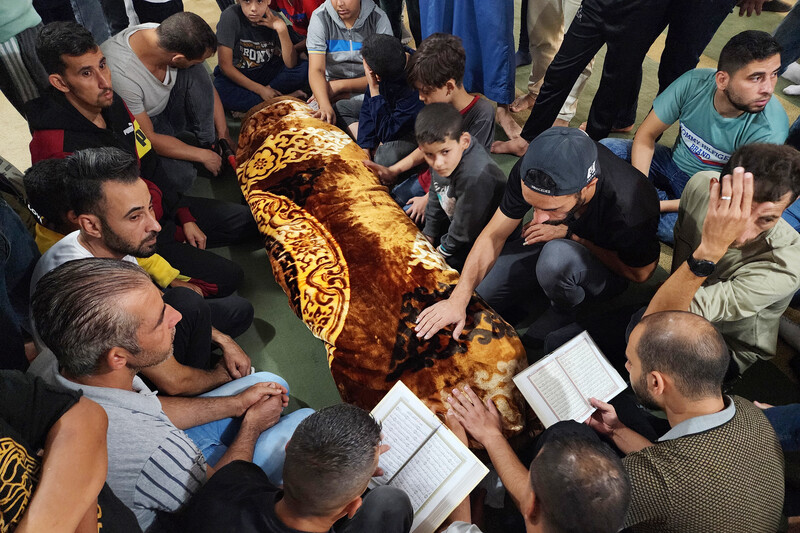The Electronic Intifada 10 November 2022

People in Gaza mourn the loss of two men after their bodies were found near the Greek island Kos; a third man — Sakhar al-Astal — is still missing.
APA imagesAhlam al-Astal can only focus on one thing at the moment: finding her son.
She had her last conversation with him on 10 October. Sakhar, her son, told her that he was heading to Greece from Turkey.
His mother pleaded with him not to risk his life. Sakhar replied that he had a good plan but did not elaborate.
On 17 October, the Palestinian Authority’s embassy in Athens released some grim details.
The bodies of two Palestinians from Gaza had been recovered near the Greek island of Kos, the embassy stated. A third man was still missing.
Sakhar, 25, is the man who has not yet been located.
A trained blacksmith, Sakhar emigrated earlier this year. He was not making enough money in Gaza to help meet his family’s needs.
He went first to Egypt and then traveled to Istanbul. He had been in Turkey for barely a month, when he and two friends set out for Greece.
The three men all hoped that they could find jobs that paid reasonably well after entering Western Europe.
Because none of them had European Union passports, their options were limited. Taking a boat to Greece would necessitate handing over hefty sums to a people smuggler.
That would cost each of them between $2,000 and $3,000.
As they could not afford such an amount, the three decided to swim toward Kos.
Lacking any information about his whereabouts, Ahlam is hugely distressed.
“Where could he be?” she said. “My only wish is to know if he is alive or dead. I cannot sleep, eat or do anything. All I think about is where he could be and what has happened to him.”
Sakhar grew up in Khan Younis, a city in southern Gaza.
So did the two men who have been confirmed as drowned: Mustafa al-Samari, 30, and Khalid Shurab, 28. Their bodies were returned to their families via the Rafah crossing, which separates Gaza and Egypt, at the beginning of November.
The eldest of nine children, Mustafa al-Samari left school at 17 and took a variety of jobs. After his mother had been diagnosed with cancer, Mustafa felt he had to supplement his father’s income.
Before COVID-19 was detected in Gaza, Mustafa worked making knafeh – a popular Palestinian dessert. Yet like so many others, he became unemployed during the pandemic.
Frustrated with the lack of opportunities, he emigrated to Turkey, where he worked as a tailor for more than two years.
Mustafa regularly called and sent text messages to his mother Sumayya. The last time she heard from him was on 9 October.
“Then I lost connection with him,” Sumayya said.
When she heard that bodies of Palestinians had been found near Kos, “I sensed that my son was among them,” she added.
Losing a future
Khalid Shurab went to Turkey in 2020, finding work there as a carpenter.
He was not happy with his pay or working conditions in Turkey but ruled out returning to Gaza, where the economic situation was even worse.
“Khalid went abroad to build a future for himself,” his mother Eman said. “But he lost that future along the way.”
Before Khalid’s body was brought to Gaza, the Palestinian Authority’s embassy in Gaza sent a photograph of the body to Khalid’s family.
“At first, I thought he had been beaten up,” said Khalid’s father Hafez. “He was all blue.”
Yet when he saw the body in Gaza, “I realized that the cold and the drowning caused this,” Hafez added.
Youth unemployment is extremely high in Gaza.
Approximately 75 percent of people aged between 19 and 29 in Gaza and holding an associate diploma certificate or higher have no job.
It is not in the least surprising that people like Sakhar, Mustafa and Khalid would leave in search of a better life. Nor – with the European Union denying the possibility of safe travel to refugees from the Middle East – is it surprising that their search ended so tragically.
Enas Fares Ghannam is a journalist based in Gaza.



